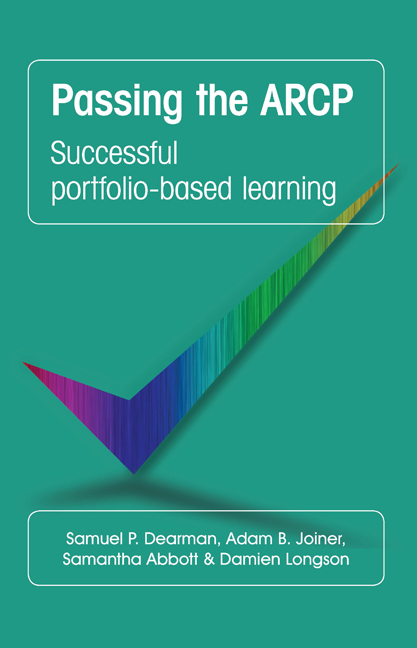Book contents
- Frontmatter
- Contents
- Authors
- List of figures
- Foreword
- Preface
- Acknowledgements
- List of abbreviations
- How to use this guide
- 1 Quick reference guide
- 2 What is a portfolio?
- 3 Lessons learned so far
- 4 Organising the portfolio
- 5 Managing your workplace-based assessments
- 6 Reflective practice and self-appraisal of learning
- 7 Audit and research
- 8 Teaching
- 9 Psychotherapy experience
- 10 Management and leadership experience
- 11 Appraisal reports, planning meetings and educational objectives
- 12 Other experiences, achievements and documents
- 13 The future of portfolios
- Index
2 - What is a portfolio?
- Frontmatter
- Contents
- Authors
- List of figures
- Foreword
- Preface
- Acknowledgements
- List of abbreviations
- How to use this guide
- 1 Quick reference guide
- 2 What is a portfolio?
- 3 Lessons learned so far
- 4 Organising the portfolio
- 5 Managing your workplace-based assessments
- 6 Reflective practice and self-appraisal of learning
- 7 Audit and research
- 8 Teaching
- 9 Psychotherapy experience
- 10 Management and leadership experience
- 11 Appraisal reports, planning meetings and educational objectives
- 12 Other experiences, achievements and documents
- 13 The future of portfolios
- Index
Summary
What is a portfolio?
The concept of what a portfolio actually is has evolved over time (McMullan et al, 2003). Earlier definitions described the portfolio in more simple terms of a record of what someone has done (Redman, 1994). The definition has been extended to include giving regard to the dynamic process of learning, including a collection of different types of work that demonstrate achievement, learning and progress over time (Wenzel et al, 1998; Karlowicz, 2000). The portfolio can therefore be seen as a means of both assessment and recognition of learning (Knapp, 1975). Contemporary learning theory extends the portfolio's role as not only a document providing evidence of an individual's competence but also the record of professional development and how this has been achieved (Price, 1994). The developmental portfolio can therefore be seen as:
‘A private collection of evidence, which demonstrates the continuing acquisition of skills, knowledge, attitudes, understanding and achievements. It is both retrospective and prospective, as well as reflecting the current stage of development and activity of the individual.’ (Brown, 1995)
The portfolio should contain evidence from a number of sources chosen at the discretion of trainees, which should demonstrate particular competencies in different ways as well as recording personal reflections on the learning process and developmental needs. Put another way, the portfolio collects evidence by recording the process of development through experience, assessment and critical self-analysis or reflection.
The approach to the developmental portfolio
The theoretical approach to the developmental portfolio assumes that the individual is able to develop as an adult learner. As a part of this assumption trainees should (Knowles, 1975):
• be able to be self-directed
• have previous experience from which to learn
• be ready to learn, developing from experience
• be curious and motivated to develop.
Therefore, portfolio-based development is not passive learning facilitated and led by an expert but is informed by the process of reflecting on experience, so-called experiential learning. The dynamic interaction between theory, practice and experience is continuous and is demonstrated in Kolb's experiential learning cycle (Fig. 2.1).
In this way, Kolb's learning cycle is an attractive model for understanding the process of development as it explains the relationship between theory, such as concepts, and reflection on practice, such as experience and the testing of concepts.
- Type
- Chapter
- Information
- Passing the ARCPSuccessful Portfolio-Based Learning, pp. 4 - 11Publisher: Royal College of PsychiatristsFirst published in: 2017



